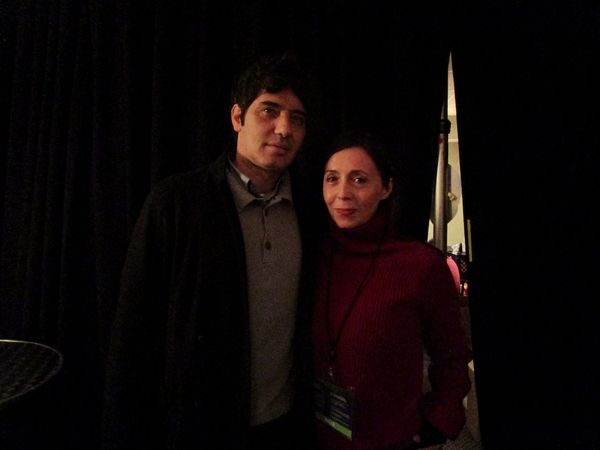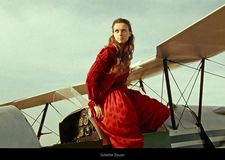Pietro Marcello’s Scarlet (L'envol), which is an adaptation by the director with Maurizio Braucci (Marcello’s Martin Eden, Abel Ferrara’s Pasolini) and Maud Ameline (Mikhaël Hers’ Amanda), in collaboration with Geneviève Brisac of the 1923 novel Scarlet Sails by Russian author Alexander Grin stars Raphaël Thiéry, Juliette Jouan, Louis Garrel, Noémie Lvovsky, and Yolande Moreau.
The film is a celebration of craft, both on screen and in the making, Pascaline Chavanne’s excellent costumes (Leos Carax’s Annette, François Ozon’s By The Grace Of God) being a prime example. She is France’s Ann Roth. The score by Gabriel Yared (Anthony Minghella’s The Talented Mr. Ripley, Cold Mountain and a Best Music, Original Dramatic Score Oscar for The English Patient - all of which feature costumes by Roth who also won for The English Patient) is truly enchanting and reminiscent of Jacques Demy and Michel Legrand’s work.
Scarlet (a highlight of the 60th New York Film Festival) tells the story of Raphaël (Raphaël Thiéry) returning from the front to the village where he lived. He is a big man with strong hands, a woodworker with great artistic talent and a love of music. His wife Marie had died in the meantime and he finds out that his baby daughter Juliette (Victoire Battist) is being taken care of by Madame Adeline (Noémie Lvovsky) who lives in a farmhouse outside the village.
Juliette shown to us at different youthful ages (Sienna Gillibert, Suzanne Marquis, Asia Bréchat) grows up in her extended family, learns what is important in life, and becomes a talented musician. She helps her father sell the remarkable wooden toys he makes to the owner of a toy shop (Rémy Roubakha) in town. Shunned by the villagers, the grown-up Juliette (Juliette Jouan) receives an oracle by the local sorceress (Yolande Moreau) that one day a ship with red sails will take her to new adventures.
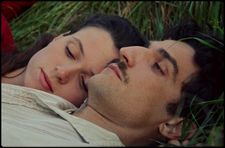 |
| Juliette (Juliette Jouan) with Jean (Louis Garrel) |
And indeed, an airship does fall from the sky, containing the handsomely moustached Jean (Louis Garrel) who woos Juliette with his charm and utterly modern outlook on interwar 20th century life. And yet, as is often overlooked, it is as in many fairy tales that the damsel is rescuing the prince. Wisdom, cruelty, decision-making - Scarlet makes us think and feel and maybe the feelings and the thoughts overlap. Nothing here caters to escapism, because war is looming, the past is never past, a big hand can protect a small one, and the wisdom of folktales should never be underestimated.
I caught up with Pietro Marcello inside the Elinor Bunin Munroe Film Center at Lincoln Center for an in-depth conversation on Scarlet.
AKT: Good to see you again!
PM: You are wearing scarlet!
AKT: Oh yes, that’s a coincidence. I wasn’t aware, but it’s perfect (and Haider Ackermann). When we spoke about Martin Eden in 2019, I brought up the fact that he was a pre-war character but we didn’t know from which war. Three different wars. And I felt you were doing something a bit similar with time in Scarlet. There’s very much fairy-tale time although you placed it so beautifully with the archival shots of World War I at the beginning. It’s clear that it’s World War I but again we get the feeling it could be any war, any soldier returning from the war. Am I correct with that?
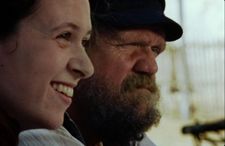 |
| Juliette (Juliette Jouan) with her father Raphaël (Raphaël Thiéry) |
PM: That was my objective. The archival footage we see at the beginning was the last day of war in the North of France. It was armistice day. It was the same area where I shot the film. It was the last day of World War I, the day the armistice was declared.
AKT: There is the precision in timing and location but it feels as though your protagonist could be out of a story by Basile or Straparola.
PM: My mission was to realise a fairy tale because the book it is based on is a fairy-tale novel. This is something I’ve always done in my movies. Even Martin Eden I wouldn’t say it’s a fairy tale but it sort of takes place in a timeless dimension. It’s the key actually to my style of filmmaking is to cross over time, to negate time, to create a kind of timeless dimension. Because cinema deep down is a transposition of reality and to the same extent that we transpose reality we can also transpose time. And fairy tales have to be timeless.
AKT: The once upon a time is exactly that. The music by Gabriel Yared is wonderful. I saw he did the score for The English Patient and The Talented Mr. Ripley and many more. In Scarlet it feels very much in the tradition of Jacques Demy and Michel Legrand. Especially Peau d’Ane, Donkey Skin came to mind. It could almost be a sequel to Donkey Skin.
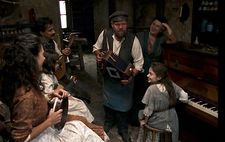 |
| Pietro Marcello on Raphaël (Raphaël Thiéry) and 5 year-old Juliette (Suzanne Marquis) with their extended family: “I think in this he represents the modern father within an enlarged family.” |
PM: First of all, this is the very first time that I worked with a composer. And it was a unique experience. Gabriel Yared stayed close to me for the entire duration of making the film. He was both a guide and for me it was a new experience to be flanked and to be working alongside a composer of that high level.
I think one of the great gifts of Jacques Demy is that he brought operetta to the movies. You know, I think what Jacques Demy did is irrepeatable. I’m not making any particular reference to the film Donkey Skin. I love Jacques Demy’s work. And I think that what he did cannot be replicated.
AKT: I agree. I did think of him not only because of the music but for the lightness of tone with which he can speak of the deepest darkest problems of humanity. In Donkey Skin he has an incest song, sung by a fairy [Delphine Seyrig], and one about lovers who don’t know what to do with each other. Your film also has a lightness while taking very seriously rape and social inequality. It speaks of women being treated as though they were witches and insane because they are standing up for themselves. But it’s all presented in beautiful images.
PM: I would say this film is a very feminine film. It’s sort of imposed upon the film because unlike the novella on which it’s based of Alexander Grin, where the woman is waiting for Prince Charming to appear, in the film this archetype of Prince Charming is destroyed in order to create space for Juliette and allow for her to choose her own destiny.
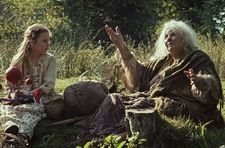 |
| 10 year-old Juliette (Asia Bréchat) with the sorceress (Yolande Moreau) |
This is where the film takes its distance from the novella because nowadays who believes in this figure of Prince Charming anyway? The figure of Prince Charming makes no sense nowadays. Nowadays men really don’t know who they are and what to do, whereas women have very clear ideas. So I think this is an aspect of the film that’s particularly modern.
AKT: Louis Garrel plays that puzzlement very well. He’s perfectly cast to play astonished that his charms don’t seem to work particularly well.
PM: Coming down from the sky!
AKT: Falling from the sky, yes. And yet, this aspect is also something that can be linked to ancient folktales. In Rapunzel for instance, there is no Prince Charming rescuing her. She is pregnant, thrown from her home, and raises two children on her own. And when they meet again it is her tears that make him see again. In a number of traditional fairy tales it is the woman healing the man.
PM: This is again a difference between the novella and the film, because in the novella she is waiting for her Prince Charming to arrive. This film is more linear and less complex than Martin Eden, which is focused on a male character. Here it’s focused on a female character and we hear this in the music and the poetry which is based on the poems of Louise Michel. This is an important distinction.
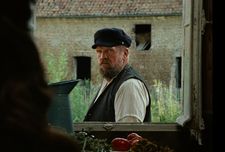 |
| Raphaël (Raphaël Thiéry) returning from the front to the village where he lived. |
The film Martin Eden starts off with the figure of Errico Malatesta, whereas Scarlet Veils, which is what I call the film, the title given to the novella, ends with this poem by Louise Michel that Juliette then transforms into a song.
AKT: Some of the scenes are so visually remarkable, his hands for instance holding her baby hands. It’s a marvellous image foreshadowing the love between father and daughter. The scene right before when we hear the baby screaming in the background, I was worried, because you have scenes in cinema where men are in a rage because a baby screams. It’s a great tension you create here.
PM: You’re actually right. Because when Raphaël arrives he has no relationship with this child and he is suffering from a kind of trauma from war. PTSD we might call it today. He is ignorant of the existence of this child.
And I think in this he represents the modern father within an enlarged family. Because this is a father who will take care of the child, even though it’s a role that some would say is still debatable today. Because we do have men that abandon their families. But he instead plays the part of both mother and father to the child and this is what makes him a modern father,
AKT: And there’s Adeline, of course, and the whole extended, non-biological family.
PM: Yes, this is the modern concept of the enlarged family.
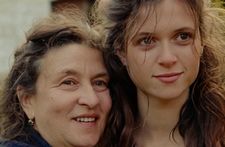 |
| Madame Adeline (Noémie Lvovsky) with Juliette (Juliette Jouan) |
AKT: Speaking of family, in your previous film Futura [together with Alice Rohrwacher and Francesco Munzi] I was struck by how many of the young people interviewed spoke of wanting very much their parents in their lives. There’s a certain longing for parental guidance.
PM: In Italy, you know, the concept of the family despite all the changes that have taken place is a fixed kind of reference. What really matters is the upbringing a child has, and if that upbringing - in Italian we call it ‘educazione’ which is not the same as education - is missing, everything else is also missing from life.
In Futura you could see that all of these kids, whether rich or poor, regardless of ethnicity are the same. It depends upon us, it depends on the education, the upbringing that we give them to make a difference. This is the base, this is the principle on which society is founded. There are no good or bad kids, children are all the same.
AKT: I agree. There is a very interesting moment in Scarlet when Juliette decides not to go to the school in the city because she feels that the education from her father is more important and being with him. And he is such an artist as well.
PM: Yes, he’s a Geppetto figure but unlike the Pinocchio story, Juliette is not a Pinocchio. She is very judicious, she takes on responsibilities, she is very aware that she has been orphaned, that she’s lost her mother. And she chooses to dedicate herself to her father in a way to stand in for her mother in taking care of him. Following her natural sentiments. So the film has this humanity to it, has a kind of simplicity in looking at the very natural relationship between a father and a daughter.
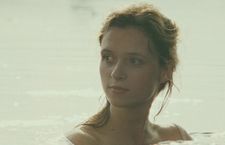 |
| Pietro Marcello: “In the film this archetype of Prince Charming is destroyed in order to create space for Juliette and allow for her to choose her own destiny.” |
If I had followed a traditional plot you might see in other movies, then at the end of the movie Juliette would have become a big star, a big singer in a gigantic theater or something. But instead after her father’s death she becomes a luthier, a violin maker, and she starts to learn and to perfect the work that she had originally learned from him. I did not imagine her to become a big star on stage and screen but rather as someone who would continue her apprenticeship, continue her love of music and poetry but by working and developing a craft in this luthier shop where we see her making a violin or a cello.
AKT: And by doing so combining his artistry with hers. He is the one who sparked both of those interests in her.
PM: In a certain sense she stays in place. So she stays with her father and thanks to him she learns the art of how to work with wood.
AKT: And working with wood always conjures up not only thoughts of Geppetto, but a Christ figure is in there as well. I also want to talk about the craft of the costumes. Pascaline Chavanne is one of the best costume designers in the business. Raphaël’s hat reminded me of van Gogh’s Postman. How was the work with her?
PM: Pascaline did great work on the costume design. For me it was a privilege to work not only with her but with the many masters of their crafts that I worked with. I never made a French film before, I didn’t even know the language. Making a film is always a collective and collaborative effort and I think we achieved a very high result because of this. I think this collaboration is very fundamental to filmmaking, this idea of working together.
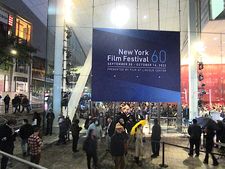 |
| The North American premiere of Scarlet was at Alice Tully Hall during the New York Film Festival Photo: Anne-Katrin Titze |
AKT: A word about how you capture nature - the birds, the magpie and swallows. The connection to nature seems central to this film and to your filmmaking in general, no?
PM: I have to say the actual act of shooting is the least of my concerns. It comes to me very easily. I myself have been a DoP and actually had a great DoP on this film, Marco Graziaplena. The creation of the image comes to me very easily, I’m much more worried about the contents of the film.
AKT: The toy shop made me think of The Tin Drum, Volker Schlöndorff’s adaptation of the Günter Grass novel. There’s a special nostalgia connected to toy stores. Probably every person in the world who ever as a child went to a toy store knows the feeling that theirs was the ultimate. Was the toy store in the novella?
PM: Yes it was already in the novella. But it was also fundamental in showing that after he comes back from the war he found a new skill, a new craft. With The Tin Drum there was no deliberate association. I of course know the film, but I especially know the novel. A very important book.
AKT: Yes, it shares the hovering wartime mood and the toy shop fulfilling many functions, presumably refuge, but not really and also simply a place of beautiful toys. The village in Scarlet is a setting rife with victim blaming. The small-town politics and the victimisation of the mother and later the attack on the daughter - that’s something so prevalent in history and perfectly interspersed here.
PM: You know, I think this is something that derives from ignorance and from not accepting strangers, not accepting foreigners even from as little as 20 kilometres away. And the fact that there is no welcome, no reception for these people. The victims of this are the fragile and the weak. We look for example at the owner of this bar, grocery store, general goods store we could call it, who is also a kind of mafia boss, who then rapes the mother, the woman while her man is away.
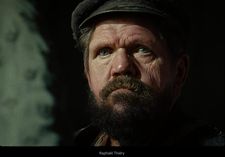 |
| Pietro Marcello: “When Raphaël (Raphaël Thiéry) arrives he has no relationship with this child and he is suffering from a kind of trauma from war.” |
Always striking at the most fragile members of the community, always striking at the most marginalised and excluded. And then attempts to do the same thing to Juliette, the kind of behaviour you would see in the poor areas around the world. It’s this act of femicide that we see where Juliette is almost condemned to the same destiny as her mother. That after the death of Raphaël, the son of the bar owner attempts to rape her as he has also had the same lack of a moral upbringing as his father.
AKT: He can’t even fully comprehend that what he does is wrong.
PM: And if she isn’t raped it’s thanks to the fact of the existence of this enlarged family, this community that was created around the farmhouse of those who had been excluded. In French they call it Cour des Miracles, in Italian it’s Corte dei Miracoli.
AKT: I don’t think there is a word for slum districts in English that has the word miracle in it. No courtyard of miracles. In the film there is no real magic, there are premonitions, there is a Cassandra foreseeing the future. Both Noémie Lvovsky and Yolande Moreau in their roles dabble in it. There is no sorcery but fortune telling under fraught circumstances.
PM: It’s more like the atmosphere of magical realism than magic itself. You know, when Adeline looks into the plate and reads the future.
AKT: What is that in the plate?
PM: It’s oil and water and … I saw that. It used to actually be done when I was young by the old women in the villages. I remember my grandmother doing this, it was common. This is something that belongs to folk culture.
AKT: I remember my grandmother, my mother’s mother doing similar things. Thank you!
PM: Thank you!








